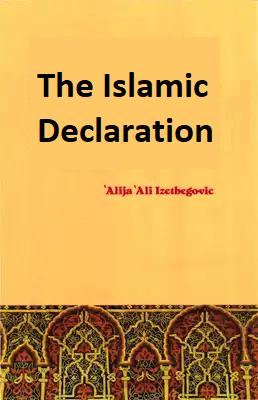Newly released
This book is new and will be uploaded as soon as it becomes available to us and if we secure the necessary publishing rights.

The Islamic Declaration Book PDF
(0)
Author:
Ali IzetbegovicNumber Of Reads:
224
Language:
English
Category:
ReligionsSection:
Pages:
41
Quality:
excellent
Views:
1569
Quate
Review
Save
Share
Book Description
The Islamic declaration: A programme for the islamization of Muslims and the Muslim peoples
The Islamic Declaration is the name of the book published by Alija Izetbegović in 1970. In 1969, Alija Izetbegović drafted the text of the Islamic Declaration, which he completed and published in 1970. After the "Sarajevo Trial" in 1983, the case gained interest, and Izetbegović was sentenced for the second time for the so-called Islamic fundamentalism. Although written in Yugoslavia, that is, in Bosnia and Herzegovina, the Declaration did not focus on the local political conditions, but on the so-called the Islamic world, which is treated in the book as a coherent spiritual, political and administrative space.
The content of the book is divided into three parts. The first part "The Backwardness of Muslim Nations" describes the ideas of Islamic renewal between conservatives and modernists, the causes of the impotence and indifference of the Muslim masses. In the second part of the book, Alija Izetbegović describes religion and law, referring to the definition of what the Islamic order essentially means. Also, Izetbegović notes in the second part that Islam is not only a religion, but also an internal and external, moral and social, spiritual and physical part of life, referring to verse 77 of Surah El-Kasas. In the part of the book "Islamic Order", Alija Izetbegović talks about the Islamic order of our time, man in the community, human equality, brotherhood and unity of Muslims, zakat and interest, republican principles, Allah as the only deity, upbringing, education, freedom of conscience, Islamic independence, work and struggle, women and family, minorities and relations with other communities. In the third part of the book, Alija Izetbegović describes the problems of the Islamic order today based on the Islamic revival as a religious or political revolution. Also, in this part, Alija Izetbegović describes the Islamic government, citing examples primarily of Pakistan, but also of other Muslim countries, and at the same time points out:
In the Muslim world, there is no patriotism without Islam.
As for Christianity, Alija Izetbegović welcomes the new tendencies declared by the last Vatican Council and evaluates them as a certain approach to the original foundations of Christianity. Alija Izetbegović also emphasizes that the Islamic attitude towards Judaism is based on the same principle as the attitude towards Christianity, where Islamic and Jewish culture are interwoven with similar, or even the same historical values. Finally, Alija Izetbegović talks about capitalism and socialism in the world.
Ali Izetbegovic
Ali Izetbegovic (August 8, 1925 - October 19, 2003) was a Bosnian politician, lawyer, Islamic philosopher and author, who in 1992 became the first president of the presidency of the newly independent Republic of Bosnia and Herzegovina. He served in this position until 1996, when he became a member of the Presidency of Bosnia and Herzegovina, and served until 2000.
He was the founder and first president of the Democratic Action Party. Izetbegovic was also the author of several books, most notably Islam Between East and West and the Islamic Declaration.
Book Currently Unavailable
This book is currently unavailable for publication. We obtained it under a Creative Commons license, but the author or publisher has not granted permission to publish it.
Rate Now
5 Stars
4 Stars
3 Stars
2 Stars
1 Stars
The Islamic Declaration Quotes
Top Rated
Latest
Quate
Be the first to leave a quote and earn 10 points
instead of 3
Comments
Be the first to leave a comment and earn 5 points
instead of 3